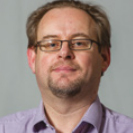Network engineers are keeping a watchful eye on the downside of quantum computer development: emergence of a cryptographically relevant quantum computer (CRQC). This machine, theorized for years, will render widely used asymmetric cryptography useless. While quantum key distribution (QKD) and Post Quantum Cryptography (PQC) are emerging solutions holding future promise, operators need to act today, using symmetric ciphers in the lower network layers. This will provide protection against harvest-now, decrypt-later attacks and also form a foundation of an evolving Quantum-Safe Network.
What can be done immediately? We discussed symmetric encryption at the optical layer (ie: OTNSec) in other Geant sessions. In this webinar, we highlight use of quantum-safe symmetric encryption at the IP layer through IPsec, MACsec, and ANYsec
This webinar will offer practical use cases that RENs can deploy today as part of their evolving plan to protect their networks against the quantum threat.
Register Here
Speakers
Chris Janson

Chris Janson is Product Marketing Manager in Nokia’s IP and Optical Network business unit where he follows trends in optical networking technology and its application to finance, healthcare, utilities, manufacturing, government, education, and other network operators. Chris has held product development, management and marketing roles in the communications equipment and semiconductor fields. He has taught engineering courses at Northeastern University and the University of Massachusetts- Lowell. He also has served on industry volunteer boards and shared his work through many webinars, written publications, on-line videos and articles. Chris holds an MBA from Boston University and Bachelor of Science in engineering from Wentworth Institute of Technology.
Mathis Bramkamp

Mathis Bramkamp, the IP Consulting Systems Engineer at Nokia, joined Alcatel-Lucent in 2012 as a student as part of a cooperative study program in Germany. He permanently joined the IP networks division in a regional delivery team after finishing bachelor studies in 2015. Mathis proceeded with master studies next to the job until 2017 and moved on into different roles more and more focusing on the software side of Network Management and network automation. He holds a bachelor of engineering in business administration and electrical engineering (as a combined program) and a master of science in distributed Computing systems engineering.







